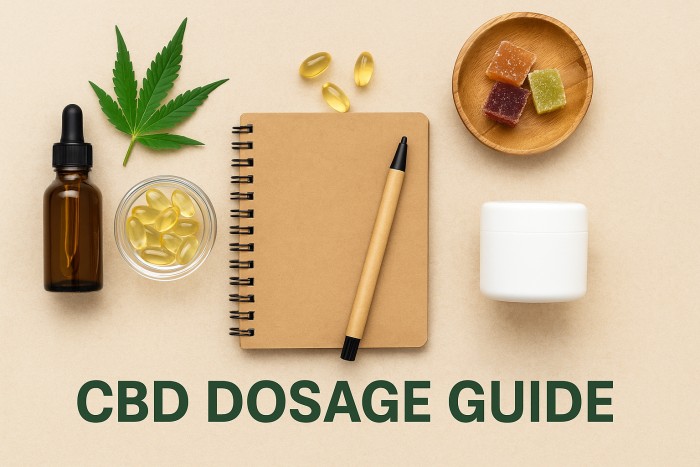Finding the right CBD dosage can feel overwhelming.
With so many products, conflicting studies, and individual differences, it’s hard to know where to begin.
Whether you’re managing anxiety, pain, or sleepless nights, this guide will walk you through research-backed steps to find your ideal dose safely and effectively.
CBD Dosage Guide for Anxiety, Pain, and Sleep
- No Universal Dosage: CBD dosage varies by individual, condition, and product type, with no standardized guidelines.
- Start Low: Begin with 10–25 mg daily, increasing gradually to find the effective dose.
- Condition-Specific: Research suggests 25–100 mg for anxiety and sleep, 2.5–40 mg for pain, but evidence is limited.
- Safety: CBD is generally safe up to 1,500 mg daily, but side effects like drowsiness may occur.
- Controversy: Lack of regulation and varying study results create uncertainty, so consult a doctor.
Why Dosage Matters
Finding the right CBD dosage is crucial for effectiveness and safety.
Too little may not provide relief, while too much could cause side effects like fatigue or diarrhea.
Dosage depends on factors like body weight, condition severity, and CBD form (e.g., oils, gummies).
Dosage for Anxiety
For anxiety, start with 25 mg daily, increasing to 50–100 mg for moderate to severe cases.
Studies show mixed results, so monitor effects closely.
Dosage for Pain
For pain, try 2.5–5 mg for mild discomfort, up to 20–40 mg for severe pain.
Topical CBD may help localized pain.
Dosage for Sleep
For sleep issues, 25–50 mg taken 1–2 hours before bed may help, with 50–100 mg for severe insomnia.
Consistency is key.
Safety Tips
Choose lab-tested products, start low, and consult a healthcare provider, especially if taking medications, as CBD may interact with drugs like blood thinners.
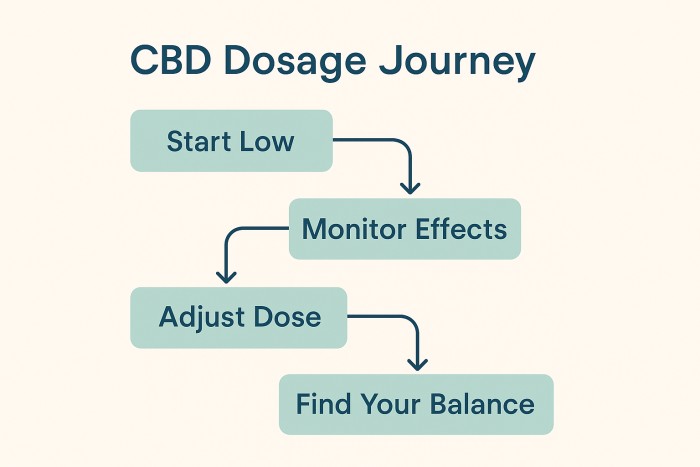
Introduction
Cannabidiol (CBD), a non-psychoactive compound from the cannabis plant, has gained popularity for its potential to alleviate anxiety, pain, and sleep disorders.
However, determining the correct dosage remains challenging due to the lack of standardized guidelines and individual variability.
This comprehensive guide explores CBD dosage for anxiety, pain, and sleep, drawing from research and expert recommendations.
It covers general dosing principles, condition-specific advice, safety considerations, and tips for finding the right dose, ensuring you can make informed decisions about CBD use.
Understanding CBD and Its Effects
CBD interacts with the body’s endocannabinoid system (ECS), which regulates mood, pain, and sleep.
Unlike tetrahydrocannabinol (THC), CBD does not cause a “high,” making it appealing for therapeutic use.
Its effects vary based on dosage, delivery method, and individual factors like body weight and metabolism.
Research, such as a 2017 review by Cannabis and Cannabinoid Research, suggests CBD is relatively safe up to 1,500mg per day, but optimal dosages differ across conditions and individuals.
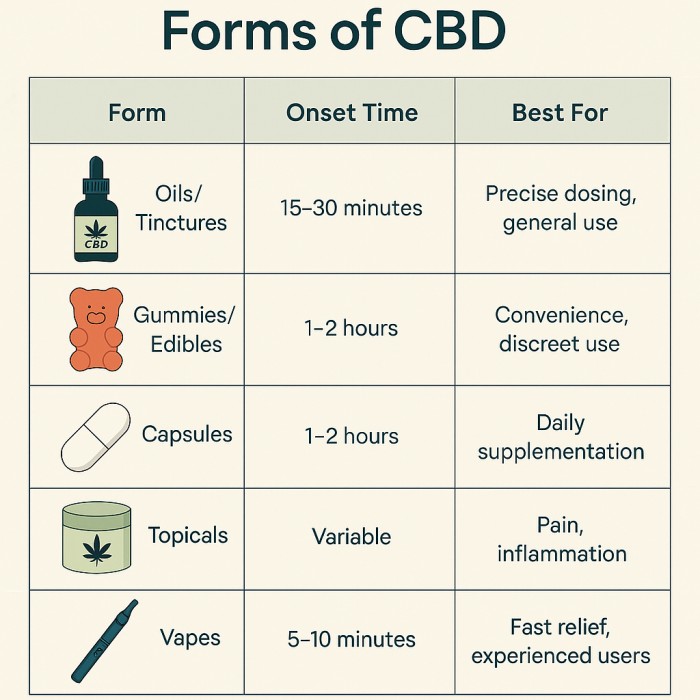
Forms of CBD
CBD is available in various forms, each affecting absorption and onset time:
| Form | Description | Onset Time | Best For |
|---|---|---|---|
| Oils/Tinctures | Liquid taken sublingually for fast absorption. | 15–30 min | Precise dosing, general use |
| Gummies/Edibles | Pre-dosed, slower onset due to digestion. | 1–2 hours | Convenience, discreet use |
| Capsules | Pre-measured pills for consistent dosing. | 1–2 hours | Daily supplementation |
| Topicals | Creams or balms for localized relief. | Variable | Pain, inflammation |
| Vapes | Inhaled for rapid effects, but potential respiratory risks. | 5–10 min | Fast relief, experienced users |
Explore our carefully curated selection of THC-free CBD products – perfect for Idaho residents.
General CBD Dosage Guidelines
There is no universal CBD dosage due to individual differences and limited regulatory oversight.
General starting points include:
- Low Dose: 10–25 mg per day
- Medium Dose: 25–50 mg per day
- High Dose: 50–100 mg per day or more, depending on the condition
Experts recommend starting with a low dose and increasing gradually every 3–7 days until the desired effect is achieved.
This “start low and go slow” approach minimizes side effects and helps identify the optimal dose.
A 2020 study in the Journal Of The American Pharmacists Association emphasizes that dosages vary widely, and clinical studies have used doses from 6–400 mg.
CBD Dosage for Anxiety
Anxiety disorders, affecting millions globally, may benefit from CBD’s interaction with serotonin receptors, potentially reducing stress and promoting calm.
A 2018 case series published in The Permanente Journal examined 72 adults with anxiety or sleep disorders.
After one month of daily CBD use (25–175 mg), 79.2% reported decreased anxiety, with improvements maintained over three months.
Additionally, 66.7% experienced better sleep within the first month.
Recommended Dosages for Anxiety
- Mild Anxiety: Start with 10-25 mg per day, taken as a single dose or split into two.
- Moderate to Severe Anxiety: Increase to 50–100 mg per day. Some studies, like a 2019 case series, used 25–175 mg daily, with 79.2% of patients reporting improved anxiety Cannabidiol in Anxiety and Sleep.
Tips for Using CBD for Anxiety
- Take CBD 30–60 minutes before anticipated stress for acute relief.
- Use consistently for chronic anxiety, as effects may build over weeks.
- Monitor mood and adjust dosage, noting that high doses (e.g., 300 mg) may be needed for acute cases but are less common.
CBD Dosage for Pain
CBD’s anti-inflammatory and analgesic properties make it a candidate for managing chronic pain, such as arthritis or neuropathy.
A 2017 study in Pain found CBD reduced joint inflammation and pain in rats, suggesting potential human benefits Attenuation of Inflammation.
Recommended CBD Dosages for Pain
- Mild Pain: 2.5–5 mg per day, often via topical application for localized pain.
- Moderate Pain: 5–20 mg per day, using oral or topical forms.
- Severe Pain: Up to 40 mg per day, with some individuals requiring higher doses.
A 2019 systematic review published in the British Journal of Clinical Pharmacology analyzed various clinical studies and found that effective CBD doses ranged from less than 1 mg/kg/day up to 50 mg/kg/day across different medical conditions.
The review noted that higher doses tended to yield better therapeutic outcomes.
However, it emphasized the need for more pharmacokinetic studies and phase III trials to establish optimal dosing guidelines for specific conditions like chronic pain.
Tips for Using CBD for Pain
- Apply topicals directly to affected areas for localized relief.
- Use oral forms (oils, capsules) for systemic pain, such as fibromyalgia.
- Combine with other therapies (e.g., physical therapy) under medical guidance.
CBD Dosage for Sleep
Sleep disorders, including insomnia, can disrupt quality of life.
CBD may improve sleep by reducing anxiety and promoting relaxation.
A 2023 study by Medical Cannabis and Cannabinoids used 8–390 mg/day of CBD.
Recommended Dosages for Sleep
- Mild Sleep Issues: 25–50 mg per day, taken 1–2 hours before bedtime.
- Moderate to Severe Sleep Issues: 50–100 mg per day, with some studies using up to 175 mg.
The 2019 study in The Permanente Journal found CBD improved sleep scores in 66.7% of patients at doses of 25–175 mg.
Tips for Using CBD for Sleep
- Take CBD 1–2 hours before bed to allow absorption.
- Avoid daytime drowsiness by testing doses at night first.
- Pair with sleep hygiene practices, like limiting screen time.
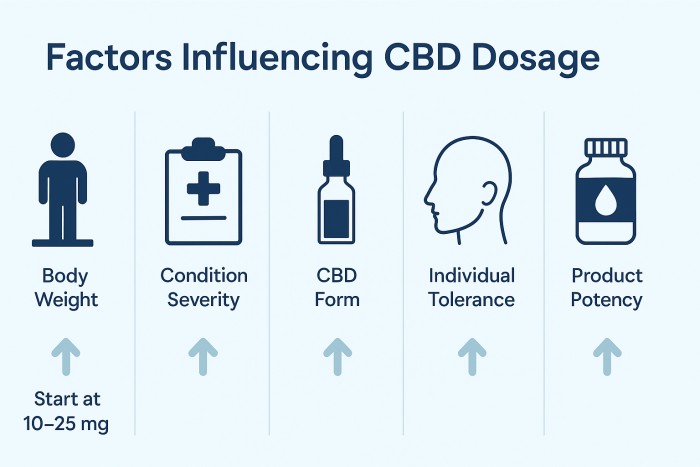
Factors Influencing CBD Dosage
Several factors affect the optimal CBD dosage:
| Factor | Impact on Dosage |
|---|---|
| Body Weight | Higher weight may require higher doses (e.g., 1–2 mg per kg of body weight). |
| Condition Severity | Severe symptoms may need higher doses for effectiveness. |
| Individual Tolerance | Sensitivity varies; some need lower doses to avoid side effects. |
| CBD Form | Oils absorb faster than edibles; topicals are localized. |
| Product Potency | Higher-potency products require smaller volumes for the same dose. |
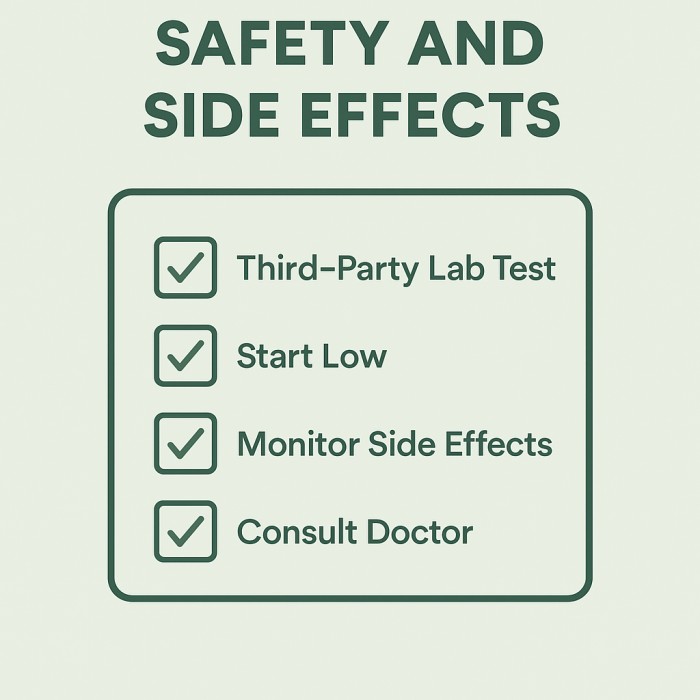
Safety and Side Effects
CBD is generally safe, with no toxicity reported at doses up to 1,500 mg daily.
Common side effects include:
- Dry mouth
- Drowsiness
- Changes in appetite
- Diarrhea (at high doses)
Drug Interactions
CBD can interact with medications metabolized by liver enzymes (e.g., CYP3A4), such as blood thinners.
A Medical News Today article advises consulting a doctor if taking other drugs.
Product Quality
The unregulated CBD market poses risks of mislabeling.
A 2017 study in The Journal of the American Medical Association found 26% of products had less CBD than labeled.
Choose products with third-party lab testing (Certificate of Analysis) to verify CBD content, THC levels (<0.3%), and absence of contaminants.
How to Find the Right Dosage
To determine your ideal CBD dosage:
- Start Low: Begin with 10–25 mg daily, split into 1–2 doses.
- Monitor Effects: Track symptoms and side effects in a journal.
- Adjust Gradually: Increase by 5–10 mg every 3–7 days until effective.
- Consult a Professional: Seek medical advice for personalized dosing, especially with health conditions or medications.
Dosage Calculator Example
To get a more specific CBD dosage recommendation use our CBD dosage calculator and view the more detailed CBD dosage chart for body sizes under 25 lbs and over 250 pounds for mild, medium, and severe needs.
| Condition | Body Weight (lbs) | Starting Dose (mg/day) |
|---|---|---|
| Anxiety | 100–150 | 20–40 |
| Pain | 150–200 | 10–20 |
| Sleep | 100–150 | 25–50 |
Adjust based on response and condition severity.
Legal and Regulatory Considerations
In the U.S., hemp-derived CBD with <0.3% THC is federally legal under the 2018 Farm Bill, but state laws vary.
The FDA regulates CBD, approving only Epidiolex for epilepsy, leaving other products without official dosage guidelines FDA Regulation.
Always check local laws and choose compliant products.
Conclusion
CBD offers potential relief for anxiety, pain, and sleep issues, but finding the right dosage requires a personalized approach.
Start with 10–25 mg daily, adjust based on response, and prioritize high-quality, lab-tested products.
Consult a healthcare provider to ensure safety, especially if taking medications.
While research supports CBD’s benefits, varying study results and regulatory gaps highlight the need for caution and informed decision-making.
Key Citations
- Healthline: CBD Dosage Guide
- 2017 Review on CBD Safety
- Medical News Today: CBD Dosage Overview
- Verywell Mind: CBD Dosages for Different Purposes
- Medical News Today: Best CBD for Anxiety
- Medical News Today: Best CBD for Sleep
- Cannabidiol in Anxiety and Sleep: A Large Case Series
- CFAH: CBD Dosage for Pain, Anxiety, and Sleep
- Natural Ways CBD: CBD Dosage Calculator and Chart
- Attenuation of Inflammation by Cannabidiol in Rat Osteoarthritis
- Consumer Reports: How to Shop for CBD
- FDA Regulation of Cannabis and CBD Products
About The Author
Joseph Powers is the founder of Legal CBD Idaho and a trusted voice in Idaho’s hemp and CBD space. With over a decade of experience in cannabis compliance and education, Joseph is committed to helping Idahoans confidently understand what’s legal, what works, and where to buy safe, effective CBD products in the state.
A Twin Falls local, Joseph brings a consumer-first approach to navigating Idaho’s strict laws around hemp-derived CBD. He personally reviews legal updates, verifies product claims, and explains everything in plain English—so you can make informed, stress-free decisions about your wellness.
Joseph is not affiliated with any CBD brand, ensuring every review and guide on this site is unbiased and rooted in facts, not hype. Whether you're just curious or looking for trusted products that meet Idaho’s 0.0% THC requirement, his goal is simple: to give you honest answers backed by research, not rumors.
Got a question about CBD in Idaho? Email Joseph directly at joe@legalcbdoilidaho.com.

